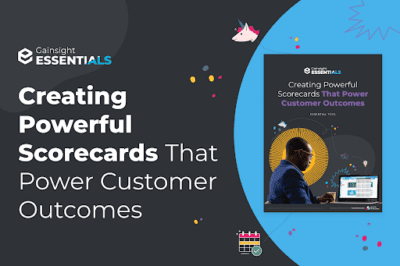Customer health scoring is a crucial tool for measuring and predicting customer sentiment, retention, and expansion. But many organizations stumble when designing their first scorecard, failing to grasp the nuances and potential pitfalls involved.
In our recent Titans of Scale webinar, we dug into perspectives on health scores from both a Customer Success (CS) leader and a Customer Success Manager (CSM) at the AI-powered connected workspace platform Notion. The discussion covered the essential features of a good scorecard, how to implement accurate measures across customer segments, and the role of CS Operations in supporting this critical company tool.
Follow a Framework to Give Your Health Scores the Right Impact
A well-designed scorecard should empower CS leaders and CSMs to achieve several key objectives. First, it should provide proactive actions to mitigate risks and strengthen customer relationships, leading to better retention forecasting. Second, it should facilitate effective prioritization of accounts by highlighting customers who require immediate attention. Finally, it should equip CSMs with tactical approaches to engage with customers and address their specific needs.
Gainsight uses the DEAR framework to grow and forecast Net Revenue Retention (NRR). Similarly, Notion has designed a process to realize the incredible impact that a solid scorecard has on the bottom line. They use a D-R-E-A-M model that includes all of their essential indicators of customer health:
- Deployment: Assess entitlements and monitor the number of licenses bought versus the number being utilized.
- Relationship: This is a qualitative measure that weighs the subjective perspectives of the CSM and Account Manager (AM) on the account. Each month at Notion, this pair goes through accounts and updates the score based on their feelings about the relationship.
- Engagement: Notion created a specific metric and playbook for stale users—those who haven’t logged in for more than six months.
- Adoption: Notion has a Product-led Growth model, where high usage is the goal in order to create stickiness. The health score reflects product adoption over time to help CSMs both prioritize churn risks and determine what’s going well for each customer.
- Mature Adoption: Power users for any product provide a lot of value to a company. Aside from boosting the chances their account will renew, they’re often advocates who can help inform and engage other customers and prospects. The team at Notion has identified their power users as the people who interact with and create databases. Having this specific action as a measure in the scorecard helps keep the team focused on how to move customers into this coveted segment of power users.
Determining score thresholds for benchmarking purposes requires a balance between setting realistic expectations and maintaining a high standard of performance. Notion regularly reviews and adjusts their health score to account for both internal and external factors impacting customer success.
Segmentation and Embedding Health Scoring
It’s important to remember that customer health scoring isn’t one-size-fits-all. Notion recognizes that customer engagement levels vary across different segments. As a result, they adapted their health scoring approach to reflect the specific characteristics and requirements of each of their customer segments.
For example, Notion simplified their scale segment scorecard to two parameters: Deployment and Adoption. The workflows that get triggered based on the score are different for these segments. Instead of CSM or AM intervention, Digital CS tactics such as filtering in marketing content or encouraging community and training engagement, take precedence.
Utilizing specific measures and scoring by segment allows CSMs to meet customers where they are in their maturity. They can then intervene based on what the customer needs, which varies by segment.
At Notion, the team started simple, then layered in more parameters over time. These include both quantitative and qualitative measures to provide accurate visibility into customer health. The team cautioned against overreliance on automated signals without incorporating manual measures or overrides for nuanced situations. That way, your scorecard doesn’t give you mixed signals about customer health.
Get more guidance on creating and optimizing your scorecard with this Essential Tool: Creating Powerful Scorecards That Power Customer Outcomes.


